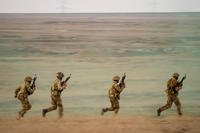A day after the Pearl Harbor attacks, America's "man on the street" and a few women, shared their hope, fears and some conspiracy theories on the Day of Infamy that was to change their lives -- and the world -- forever.
A mother in Austin, Texas, said her son would now go into the Army, and if he had to die to defeat Imperial Japan, so be it. Her husband said "Wherever he's needed, he's ready to go."
A "merchant" in Bloomington, Indiana, said "I'm sure I was just an isolationist" before Dec. 7, 1941, but "it seems we are ready to do anything to stop this Japanese invasion."
An electronics technician in New York City saw something possibly sinister in the fact that the U.S. ships were lined up on "battleship row" in Pearl Harbor for the Japanese carrier warplanes to attack, rather than out at sea looking for the enemy. He said "My first thought was why were they there?"
Related: Pearl Harbor: Day of Infamy
The recorded interviews have been collected and preserved in the Library of Congress. In December 1941, before the attacks at Pearl Harbor, legendary folklorist Alan Lomax had 18 fieldworkers around the country collecting folk music for the Archive of American Folk Songs.
But when the attacks came on Dec. 8, 1941, Lomax told the fieldworkers to drop their assignments and instead do "man on the street" interviews.
In January and February 1942, a second set of interviews was conducted in which the participants were asked to address "Dear Mr. President" remarks to President Franklin D. Roosevelt. Some gave their names, and others were simply recorded as a "man on the street" in various locations around the country.
In his "Dear Mr. President" comments, Carlos Lopez, of Phoenix, Arizona, said he would be joining the Marines: "I, like any other American, would like to do my part in this war, and I believe the Marines will show me more action."
"As for the Spanish people born in the United States, I believe they all have the same opinion that I have," Lopez said. "We feel that we should fight and defend this country as soon as possible."
Some expressed fears of Japanese-Americans aiding Japan, while others said Japanese-Americans would prove themselves loyal.
A man in Burlington, North Carolina, said "They should just clean up all the Japanese in this country so they can't do us in the dirt. Not just through the duration of the war, but all of them. We just pen them up and keep them."
But William Patterson of Buffalo, New York, said he was encouraged by expressions of loyalty from Japanese-American citizens on the West Coast.
"No, I don't hate them," he said. "I was very much interested in a news flash I heard over the radio from the Japanese citizens on the West Coast expressing their loyalty to the president and their shock at the action that their country, original country, had taken."
In his "Dear Mr. President comments, Robert Heckly, of Tucson, Arizona, said "I'm planning my career, Mr. Roosevelt, but if I can do anything in between that time I would be glad to. Do not expect me to be in the Army because -- unless I'm drafted -- my mother and father will not permit it, as much as I would like to."
On Dec. 8, a man on the street was stopped in Washington, D.C., and asked "Well, how did you feel about it when we first heard about the Japanese war."
He responded: "Well, I felt, I'll be called into the draft pretty soon. I'm eligible, I'm in the 1-A classification and it hit me pretty bad. I was expecting something to happen, but this, even when it did come along, well it does surprise me. I didn't expect it so soon."
"How do you feel do you about the chances, I mean generally?" the interviewer asked.
"Well, I believe that the United States will eventually win out," the man said.
Then he was asked "What do you think it means in terms of the other Axis powers?"
The man responded: "Well, I believe that if we do defeat Japan it won't be the end, but we'll have to finish off the other Axis powers before anything else will be settled. Because the other Axis powers, I believe, will fight until either Japan is fixed up again or until they're defeated."
-- Richard Sisk can be reached at Richard.Sisk@Military.com.













